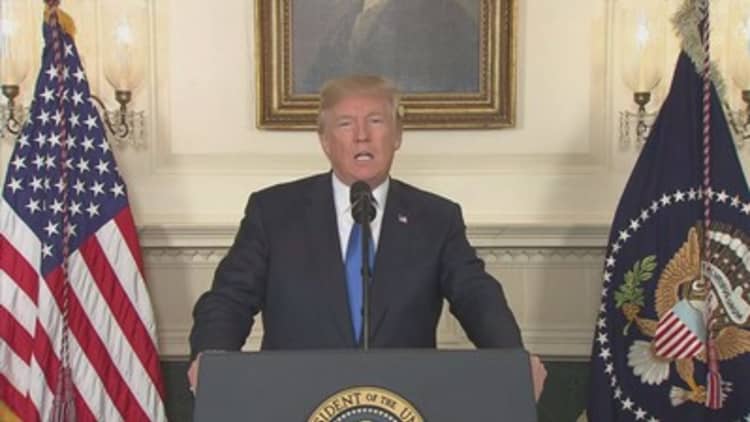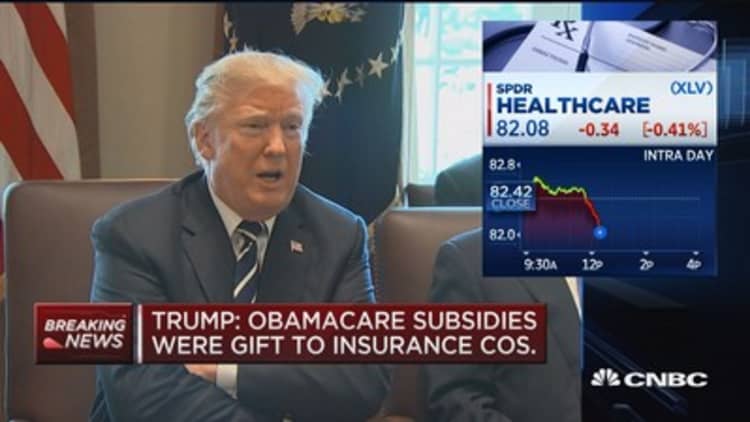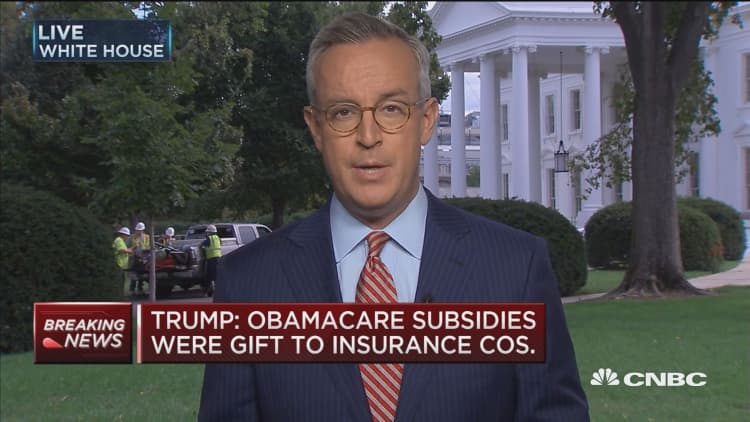
President Donald Trump on Monday said there is "no such thing as Obamacare anymore" — one of a series of claims about health-care policy that he repeated in the face of either strong evidence or arguments to the contrary.
But Trump also noted that lawmakers are working on a "short-term fix" for health-care markets — which many Democratic members of Congress, some Republicans, insurers, health providers and patient groups are clamoring for after Trump took two actions last week that are expected to undercut Obamacare markets.
Last Thursday morning, Trump signed an executive order that directed federal agencies to look into making regulatory changes that could increase enrollment in health plans that do not satisfy minimum standards set by the Affordable Care Act.
On Thursday night, the Trump administration said it would stop paying Obamacare insurers billions of dollars in reimbursements for discounts that insurers must give by law to low-income customers of their ACA plans.
On Monday morning, Trump said: "Obamacare is finished, it's dead, it's gone."

"There is no such things as Obamacare anymore."
But Trump's fellow Republicans in Congress since the spring have repeatedly tried and failed to pass a bill that would repeal and replace just parts of Obamacare.
Obamacare remains the law of the land, and nearly all Americans are still required by it to have some form of health coverage or pay a tax penalty. Enrollment in Obamacare plans starts Nov. 1.
"I think we have the votes right now" to pass an Obamacare repeal-and-replace bill, Trump told reporters at the White House in wide-ranging remarks after a Cabinet meeting.
But GOP leaders in the Senate do not have enough votes. If they did, they would have held a vote on the replacement bill at the end of September, instead of shelving the measure as they did.
Trump said he expected such a bill, which he described as a "long-term fix" for health care, to get resurrected next spring.
And he predicted it will pass.
But Trump and congressional leaders have made such predictions about ending Obamacare in its present form since he took office in January. None of them have come to pass.
"We'll have a long-term fix," Trump said. "Most people know that's going to be a very good form of health insurance."
However, a poll released last week by the Kaiser Family Foundation found that 7 out of 10 Americans believe it is more important for Trump to help make Obamacare work than to make it fail.
The Kaiser poll found that 66 percent of people believe it is more important that Trump and Congress work on legislation to bolster the marketplaces than to continue their efforts to repeal and replace major parts of the ACA.
Trump also noted Monday that last week he "knocked out the CSRs, that was a subsidy to the insurance companies, that was a gift" to insurers.
"Hundreds of millions of dollars a month handed to insurance companies, for very little reason, believe me," Trump said of those payments. CSRs are cost-sharing reduction reimbursements that the federal government for years has paid insurance companies.
But there were very big reasons that CSRs were included in the ACA when it was passed. The payments were aimed at encouraging low-income people to sign up for Obamacare coverage. The ACA offered the CSRs to cover out-of-pocket health costs for this group if they are enrolled in certain types of Obamacare plans.
Insurers must grant those discounts, by law, to qualified customers. To compensate insurers for the discounts, the federal government had paid them reimbursements for the CSRs.
Trump last week said the federal government will stop paying the CSRs.
Insurers, who still must give 6 million or so customers the discounts, in turn will raise their premium prices for customers, or leave the Obamacare markets altogether as a consequence.
Trump on Monday said "when the premiums go up" for Obamacare plans, "that has nothing to do with anything other than the fact that we had poor health care delivered, poorly written."
But the Congressional Budget Office, in an analysis in August, said that if Trump cut the CSRs, premium prices were expected to spike by an extra 20 percent in 2019 beyond what they otherwise would have been.
And premiums are projected to be 25 percent above what they otherwise would have been in 2020 because of the cutoff, the CBO said.
"The gravy train ends the day I knocked out CSRs," Trump said, referring to insurers.
Actually, that gravy train, if there is one, may have actually gotten tastier, for insurers who don't abandon the Obamacare market.
Despite the fact that the government will save billions of dollars from not paying the CSRs, net federal payments to insurers will actually increase, by nearly $200 billion over the next decade, as a result, according to the CBO.
That's because the government by law is required to increase subsidies for eligible Obamacare customers' premiums when those insurance prices rise, as they will from the cut-off of CSRs.
Trump suggested that his killing the CSR reimbursements has "actually brought Republicans and Democrats together," in an effort to create a short-term fix.
However, for weeks before Trump acted, a number of Republicans in the Senate had already been talking to Democratic counterparts about a bill that would guarantee the CSRs and make other tweaks to the health-care law.
Sen. Lamar Alexander, R-Tenn., had been holding a series of hearings on that bill in September. But he suspended those efforts, temporarily it turns out, when his fellow Republicans pushed their last-ditch effort to replace Obamacare in September.
Trump suggested Monday that health insurers favored Democrats because of the CSRs.
"I'm never going to get campaign contributions, I guarantee you that, from the insurance companies," Trump said. "But a lot of other people got 'em. You look at the Democrats, take a look at that. Take a look at how much money has been spent [on] Democrats, and by the health companies on politicians."
"Take a look at the coffers of the Democrats."
Trump did in fact get relatively little in the way of campaign contributions last year from the health-care sector, compared with his opponent in the presidential race, Hillary Clinton.
But the election contribution tracking site Open Secrets notes that Republican congressional candidates "have long been the recipients of most of" the donations from the insurance industry, which includes health insurers and brokers.
WATCH: Trump says it's a disgrace Obamacare subsidies go to health insurers



